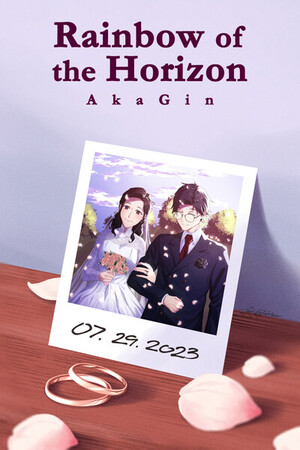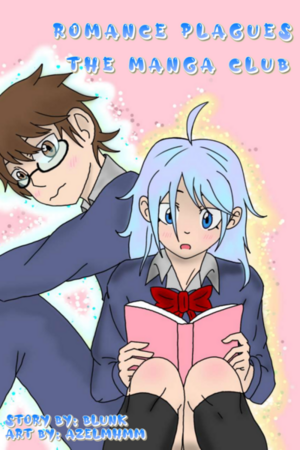Chapter 3:
Signs and Symbols
Where the Wind Whispers Your Name
I couldn’t focus.
The sound of Hikaru’s voice had already faded into the background, swallowed by the low hum of the school hallway. My hands were cold. My heart was beating too fast. A light buzz settled at the back of my skull, like the aftershock of a distant explosion.
"Better start taking your pills."
I knew he was joking. Of course he was. But the way the words slid under my skin made me want to check my own pulse. Made me want to make sure I was still here.
I sat through the next few classes like a ghost. I heard the teachers' voices, but the words didn’t stick. Fragments of conversation drifted by like noise: test dates, homework, someone laughing in the back of the class. I stared at the notebook on my desk, at the lines of empty white paper. My hand twitched, and before I realized it, I had drawn a shape — a curve crossing over another, looping into itself.
It was the pattern on her blanket.
I don’t know what made me go to the library after school. I wasn’t even sure what I was looking for.
Dreams. Memory. Psychology. Something.
I sat at the back of the library, the glow of the desk lamp casting a pale circle of light over the open books. The hum of fluorescent lights buzzed faintly above me, mixing with the soft scratch of pens and the occasional rustling of paper from the other students. My eyes scanned the page in front of me, but the words were blurring together, slipping through my mind like sand through my fingers.
"Dreams are the unconscious mind's way of processing unintegrated memories."
I rubbed my eyes and leaned back in the chair, the wood creaking beneath me. My head was still foggy. The smells and feeling of still lingered at the back of my throat — faint, but persistent. I had brushed my teeth twice that morning, and it wouldn’t go away.
I glanced down at my notebook. Half a page filled with shaky handwriting: Lucid dreaming, false awakenings, memory retention, cognitive dissonance, jungian dream analysis
I tapped my pen against the paper, the sound echoing in the silence. I had no idea what I was looking for, but I couldn’t stop. Every time I closed my eyes, I saw her face — half-obscured by the fog, the red and gold hem of her blanket fluttering at the edges of my vision. The way she said "You always come back." That certainty in her voice. Like she already knew how this was going to end.
I flipped the page of the book in front of me. It was an old psychology textbook — stained and yellowed, like it had been sitting in the library for longer than I’d been alive.
"Freud believed that dreams are expressions of repressed desires."
No. That didn’t feel right. This wasn’t some weird repression thing. It was deeper than that. Older.
I turned the page.
"Carl Jung proposed that dreams are not simply individual projections, but manifestations of the collective unconscious — symbols shared by humanity, buried deep in the psyche."
Collective unconscious. Archetypes. Symbols. Patterns.
I leaned forward, suddenly wide awake. My pulse picked up. Symbols. The red and gold pattern on her blanket. The amulet hanging from the door in the village.
I grabbed my phone and typed "Jungian symbols in dreams." The search results loaded slowly, the Wi-Fi in the library always one step above useless. I scrolled through articles and forums. Most of it was bullshit—lucid dreaming techniques, sleep paralysis stories, some edgy guy talking about how the government was planting images in our heads through 5G waves. Funny but not helpful.
And then I found something.
"Dream symbols often take the form of familiar objects, people, or places — but distorted, rearranged. A person in a dream may not represent themselves, but rather an aspect of the dreamer's subconscious mind."
The girl. She wasn't real. She couldn't be real.
But it didn’t feel that way.
I scrolled down. Another line caught my eye:
"Recurring figures in dreams may represent the anima or animus — the feminine or masculine aspect of the self that the dreamer has not yet integrated into their conscious identity."
My chest tightened.
"The anima often appears as a guide — but may also represent hidden conflict or suppressed trauma."
A guide. A symbol. A warning.
I rubbed the back of my neck, the memory of her gaze still fresh. She had looked at me with recognition — not surprise. Like she had been waiting for me.
My phone buzzed. I glanced down. Hikaru.
Hikaru: Yo, you alive?
Hikaru: We're at the arcade. Come through before you turn into a ghost, man.
Hikaru: Seriously tho, you okay?
I stared at the message for a long moment before locking the screen and setting the phone face-down on the table. My hands were shaking.
I flipped through more pages of the textbook. Diagrams of the brain. Notes on dream states and REM cycles. None of it explained why the feelings of the dream keep haunting me. Why the fog in that village had felt so real. Why the warmth of the girl's hand on mine still lingered on my skin.
I stood up, grabbing another book from the shelf — a thicker one on lucid dreaming and altered states of consciousness. My eyes darted over the words:
"In a lucid dream, the dreamer is aware of the fact that they are dreaming and may be able to manipulate the dream environment."
What if…
No. That was impossible.
"Some researchers theorize that recurring dreams may be linked to unresolved psychological trauma or suppressed memory."
Suppressed memory.
What if it wasn’t a dream?
I sat down hard in the chair, setting the book in front of me with a dull thud. My breath quickened. The sound of the other students in the library felt suddenly far away, distorted. My fingers brushed over the edge of the notebook.
My stomach twisted. What if I wasn’t dreaming? What if… I was remembering?
I pressed my hands to my face and inhaled deeply. Calm down. Calm down.
"You okay?"
I jumped at the voice. A girl stood across the table — not her — just a student in a hoodie with messy hair and tired eyes.
"Yeah," I said quickly. "Just… reading."
The girl raised an eyebrow, then shrugged and walked away.
I exhaled slowly. My pulse was still too fast. I flipped back to the page on Jungian archetypes. My pen hovered over the notebook.
I wrote one word beneath the list of terms I’d already gathered:
Anima.
I stared at it.
Then I crossed it out.
I closed the book and stood up. My head was pounding. My body felt wrong — disconnected, like I was moving through someone else's life. I walked toward the exit of the library, grabbing my phone on the way out.
I needed answers.
I wasn’t sure where to look.
But something told me that if I kept going…
She would be waiting.
My head was still pounding when I approached the library counter. The librarian—an older woman with thick glasses and a tight bun—barely looked up as she slid the book through the checkout machine. The sound of a dry beep echoed in the stale library air.
"Are you interested in psychology?" she said in a toneless voice.
"Something like that." My voice sounded hollow, distant.
The woman didn't respond. She handed me the book, and I stuffed it into my backpack with trembling hands. The weight of the old paper and hardcovers pressed against my back as I walked out the library's double doors. The cold evening air hit me in the face, but it didn't make me react.
It wasn't until I got home that I found it.
I was sitting on the edge of my bed, the book open on my knees. The smell of old paper wafted through the air. I turned a page—and then something fell between the pages.
A note.
A small sheet of paper folded in half. The rough texture was different from the book, as if someone had recently stuffed it in there.
I unfolded it.
"Nice efforts. See you today."
My fingers tightened around the paper. My heart hammered in my ears.
I jumped out of bed and looked around the room. Nothing. Just my messy desk, the clothes thrown on the chair, the gray light streaming through the window.
But the feeling that someone had been here—that someone was watching me right now—was too strong to ignore.
My eyes returned to the note. The handwriting was fine, elegant, slightly slanted. Handwriting I didn't recognize… but somehow familiar.
My hands were shaking.
The echo of his voice came back to me:
"You always come back."
I collapsed onto the bed, still holding the note. The weight of the words settled in my chest like a cold stone.
She knew I would come.
She knew I was looking for answers.
Which meant…
She was looking for something from me too.




Please sign in to leave a comment.